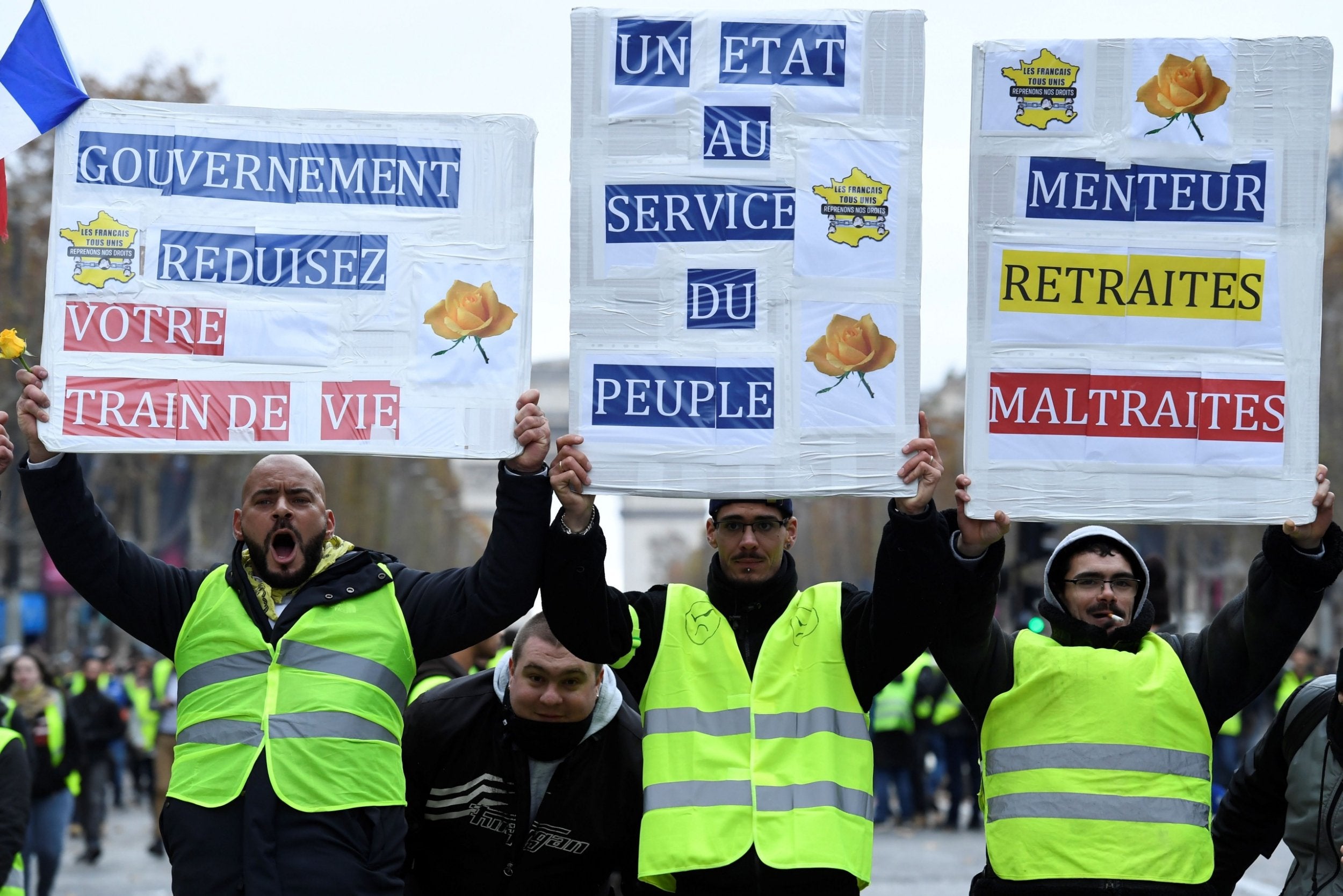Paris protests: Police unleash tear gas and water cannons as protesters demonstrate fuel tax
Fuel tax protest has widened into outburst at inequality and against ruling political class
Your support helps us to tell the story
From reproductive rights to climate change to Big Tech, The Independent is on the ground when the story is developing. Whether it's investigating the financials of Elon Musk's pro-Trump PAC or producing our latest documentary, 'The A Word', which shines a light on the American women fighting for reproductive rights, we know how important it is to parse out the facts from the messaging.
At such a critical moment in US history, we need reporters on the ground. Your donation allows us to keep sending journalists to speak to both sides of the story.
The Independent is trusted by Americans across the entire political spectrum. And unlike many other quality news outlets, we choose not to lock Americans out of our reporting and analysis with paywalls. We believe quality journalism should be available to everyone, paid for by those who can afford it.
Your support makes all the difference.Tear gas and water cannons were fired at protesters in Paris on Saturday as thousands took to the streets in protest against the country’s rising fuel tax.
Riot police were sent in as the “gilets jaunes” (yellow vests) citizens’ movement – named after the protesters’ fluorescent, high-visibility vests, which all French motorists are obliged to keep in their cars – did their best to fulfil their threat to bring the city to a standstill.
Authorities said 5,000 protesters converged on the Champs-Elysees where they faced police sent to prevent them from reaching the nearby presidential Elysee Palace.
Some protesters sang the national anthem while others carried signs bearing slogans such as “Macron, resignation” and “Macron, thief”.
Videos and pictures posted to Twitter showed violent clashes as protesters tried to break through a police cordon. At least 18 people were arrested.
Interior minister Christophe Castaner denounced protesters from the far right whom he called “rebellious”, as the rallies turned violent at the Eiffel Tower and Champs-Elysees. He also accused Marine Le Pen, leader of the Rassemblement National (National Rally) party, of encouraging them.
“The ultra-right is mobilised and is building barricades on the Champs-Elysees. They are progressively being neutralised and pushed back by police,” he said.
Ms Le Pen hit back on Twitter, saying she has simply asked the government why it did not allow the gilets jaunes to protest in the area.
“Today Mr. @CCastaner uses this question to target me. It is shabby and dishonest in the image of the author of this manipulation politician,” she said.
As fire and tear gas engulfed the Champs-Elysees, Australia’s ambassador to France warned citizens to steer clear of the city.
“There are ongoing violent protests on the Champs-Elysees in Paris, as well as other regional areas, we recommend that you maintain a safe distance from public demonstrations and follow the advice of local authorities at all times.”
For more than a week, protesters have blocked highways across the country with burning barricades and convoys of slow-moving trucks, obstructing access to fuel depots, shopping centres and some factories.

Two people have been killed and hundreds injured.
The grassroots protest has morphed into a wider outpouring over inequality and an opposition front to centrist president Emmanuel Macron.
A poll for French paper Le Figaro revealed 77 per cent of French people felt demonstrators were justified in their actions, suggesting many citizens identified with the feeling of alienation from the political class and Mr Macron’s government.
A 23 per cent rise in the price of diesel in the past year was the final straw for many struggling families.
A man was arrested following a dramatic stand-off with police on Friday when he demanded that “the yellow vests be received at the Elysee Palace”, the president’s official residence in Paris, while brandishing an apparent grenade at a supermarket in the western city of Angers.
Mr Macron, who has tried to present himself as “humble”, is accused of indifference to the struggles of ordinary people. “Macron, we are not your sheep,” a banner held aloft by roadside protesters in Montceau-les-Mines read on Friday.
“I hope there will be a veritable yellow tide,” said one of the leaders of the movement, the right-wing political figure Frank Buhler.

Despite the rising tensions the French leader defended the rising cost of diesel as necessary to reduce France’s dependence on fossil fuels.
“We will be uncompromising because we can’t accept the things we’ve seen,” he said.
In a TV interview last week, he admitted he had “not succeeded in reconciling the French with their leaders” and vowed to give provinces more of a say in policymaking.
“There are legitimate grievances that have to be given a hearing,” he told his cabinet on Wednesday.
Additional reporting by agencies

Join our commenting forum
Join thought-provoking conversations, follow other Independent readers and see their replies
Comments